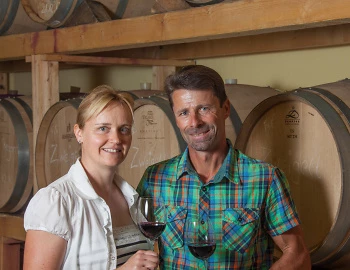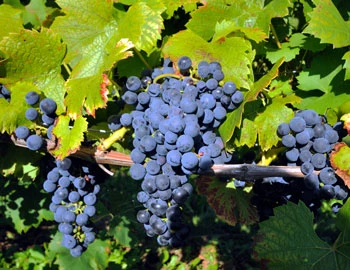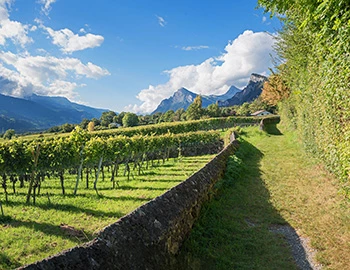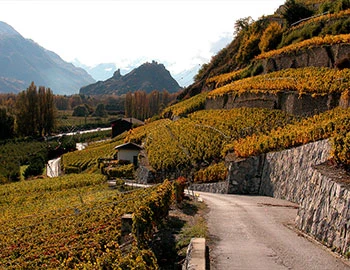Cuvée 1844 Noir 2020
Ostschweizer Landwein, Roland und Karin Lenz, 750 ml

| Grape variety: | Pinot noir |
| Producer: | Roland und Karin Lenz |
| Origin: | Switzerland / Ostschweiz |
| Other vintages: |
Description
Initially somewhat reserved, but on careful tasting, it reveals a wide range of aromas: black cherry and prune completed by cumin, white pepper and bay leaf. Liquorice and the delicate scent of wilted roses as well as leathery and tarry nuances later on. On the palate, it surprises with a wonderful fruity fullness, a juicy acidity and soft tannins, developing into intense flavours with a remarkable finish.
Attributes
| Origin: | Switzerland / Ostschweiz |
| Grape variety: | Pinot noir |
| Label: | Vegan, Certified organic or biodynamic wine |
| Ripening potential: | 1 to 8 years after harvest |
| Drinking temperature: | 16 to 18 °C |
| Food Pairing: | Vegetable cous-cous, Mushroom ragout, Risotto with ceps |
| Vinification: | long must fermentation, fermentation in wooden barrel, Punching down, soft pressing |
| Harvest: | hand-picking, drying of the grapes |
| Maturation: | in new barriques, short cultivation |
| Bottling: | no filtration |
| Maturation duration: | 10 months |
| Volume: | 14.0 % |
| Note: | Contains sulphites |
Roland und Karin Lenz
In 1994, while Roland Lenz was still studying oenology, he and his wife Karin were able to acquire eight hectares of vines on the Iselisberg. It was a unique opportunity that they seized, even though they were toying with the idea of setting up their own business abroad, far from Switzerland. They actually did so later, but that's another story…
It is only in the last two decades that the Canton of Thurgau has really come to the attention of wine lovers as a wine-growing area. Its apple orchards and the apple juice (must) pressed from the picked fruit have always been popular, inevitably earning the canton its nickname of «Must India». Viticulture, however, has existed in this region for centuries.

Pinot noir
Blueprint of the terroir
No other variety expresses its terroir as precisely as Pinot noir. It is a sensitive, fragile grape. But when it succeeds, it gives the world some of its very greatest wine plants. It especially excels in Burgundy, where it has been cultivated for at least 700 years. Even in the middle ages, it was considered so precious that it was kept separate from other grapes so as to not diminish its value. The finest examples are delicate and fragrant with aromas of cherries and red berries. With maturity, notes of forest floor, leather and truffles enter as well. An irresistible fruity sweetness still shines through, even after several decades. The Pinot noir does well in cool locations: in Switzerland and in Germany, where it is known as Blauburgunder and Spätburgunder respectively; in Alsace and in South Tyrol, in Oregon, New Zealand and Tasmania. Not least, it yields fantastic champagnes. It is a wonderful culinary companion. With its soft tannins and charming bouquet, it meshes with everything, from Güggeli and cheeses to fried fish.

Ostschweiz
Eastern Switzerland: an intriguing puzzle
Eastern Switzerland has long been positioned on the northern rim of the climate zone where the cultivation of popular Swiss varieties is possible. Due to a warming climate, the vineyards of Aargau, Zurich, Schaffhausen, Thurgau and Graubünden are now in the zone where varieties such as Müller-Thurgau or Pinot Noir succeed excellently. But even long-established, almost-forgotten varieties such as Elbling, Räuschling and Completer are experiencing a renaissance.

Switzerland
Switzerland – A small country with enormous diversity
Switzerland is famous for its banks, watches, and cheese, but not necessarily for its wine. The Swiss didn't invent wine, but they have been extremely open and curious to it. Wine culture arrived in what is now modern Switzerland via several routes: from Marseilles to Lake Geneva and the Lower Valais region; from the Aosta Valley through the Great St. Bernard Pass to the rest of Valais; from the Rhone through Burgundy, across the Jura Mountains to Lake Constance; and from Lombardy to Ticino, and then on to Grisons.



